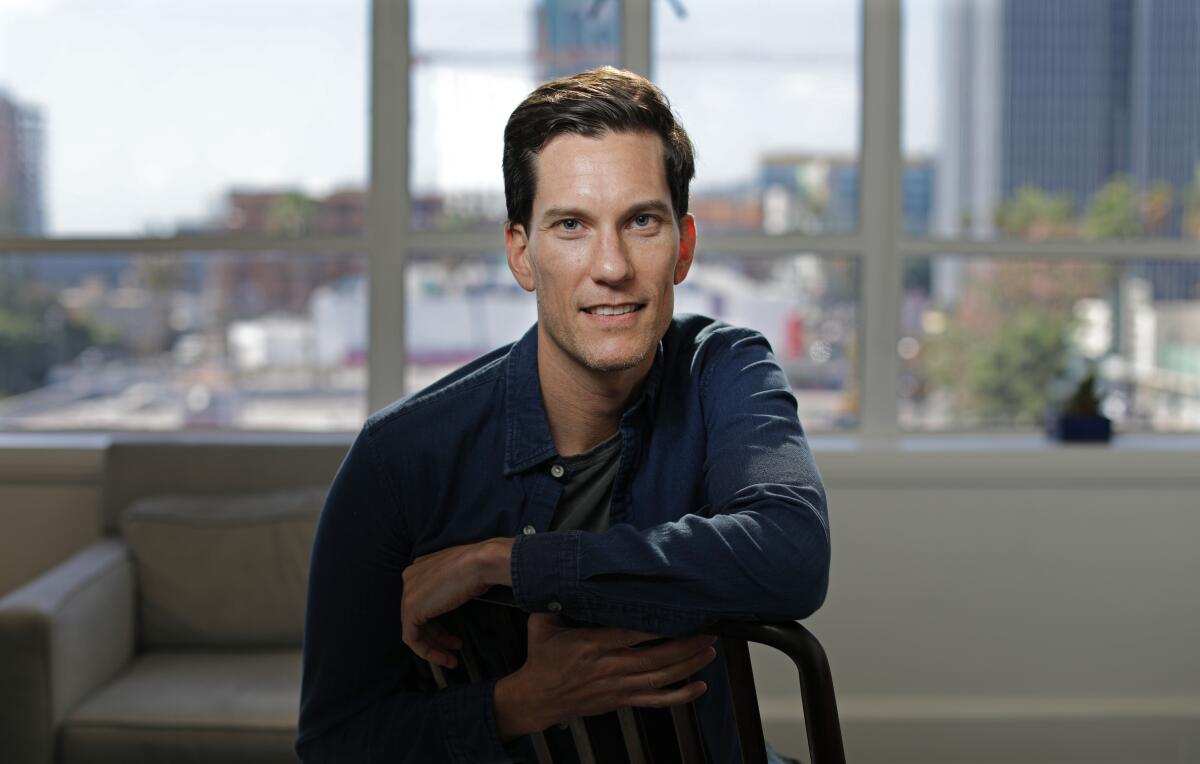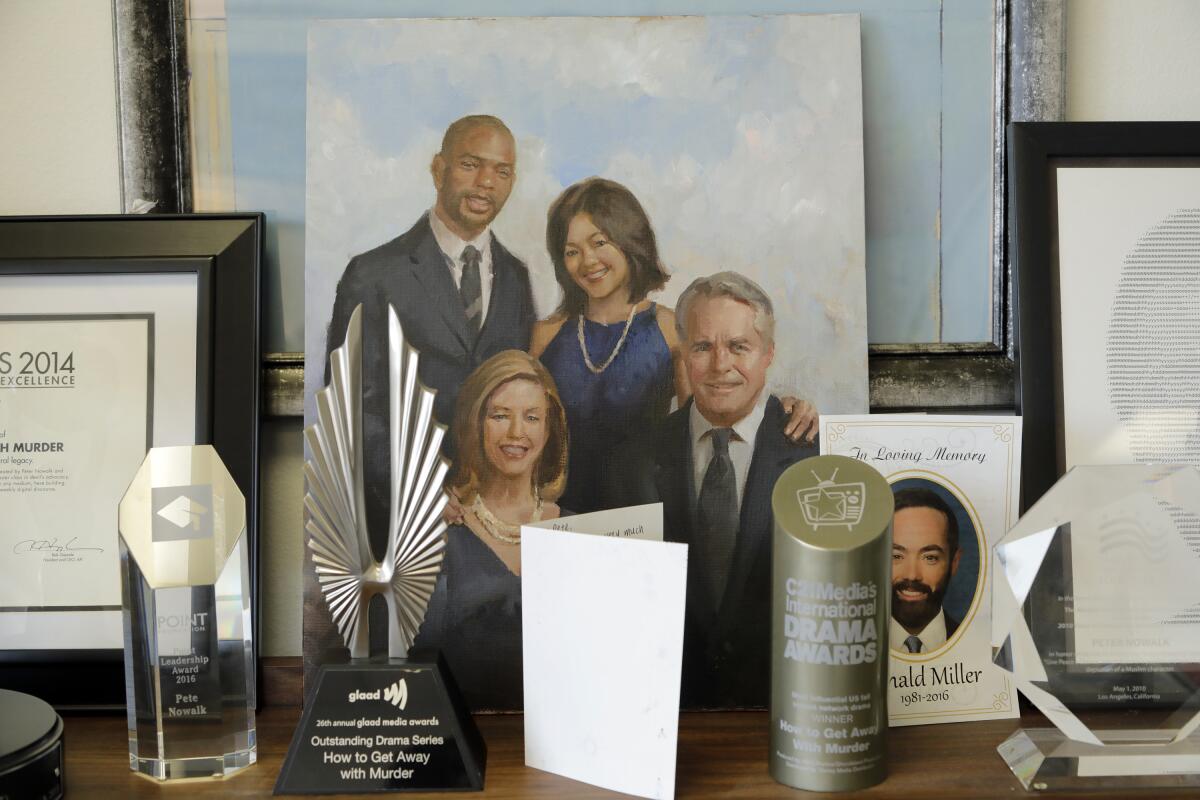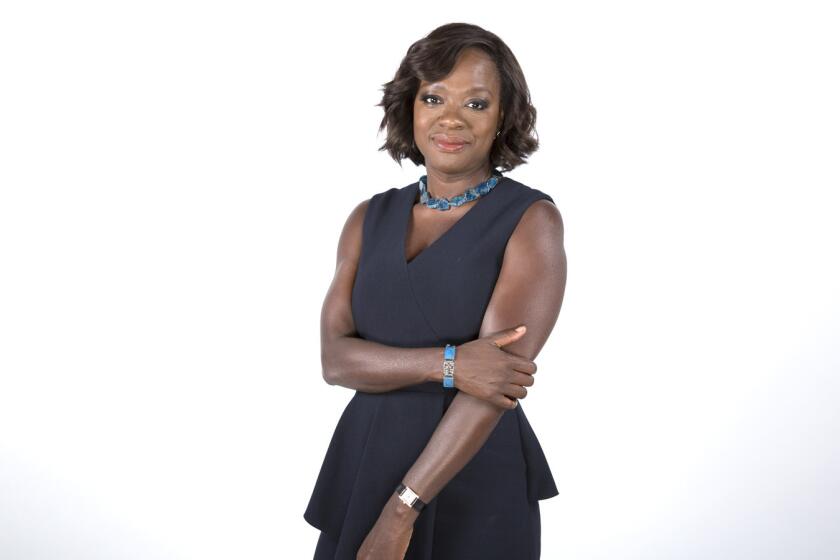He learned from Shonda Rhimes. But he made ‘How to Get Away With Murder’ all his own

- Share via
The final season of ABC’s “How to Get Away With Murder” has left fans hanging longer than expected. Its most recent episode aired five months ago — a wait that would surely have tested the patience of the show’s antiheroine Annalise Keating (Viola Davis), let alone fans. But series creator Pete Nowalk is ready to deliver a killer ending.
After spinning a web of mysteries and flash-forwards while tackling issues such as criminal justice reform and addiction during its run, the backdrop to the ABC drama’s swan song is the final semester of law school for the students viewers first met in Keating’s criminal law classroom.
Since every day in recent weeks has felt like a year, you may need a refresher on what went down in its November midseason finale before its final, six-episode run begins on Thursday: Once presumed dead, Wes Gibbons (Alfred Enoch) is shown in a flash-forward at Keating’s funeral, becoming another suspect in her death. And Asher Millstone (Matt McGorry), who was revealed to be an FBI informant, is killed — but who murdered him? Thursday’s episode will pick up where the fall finale left off.
“The first episode really shows the rifts between certain groups in our world,” Nowalk says. “People who have always been together and leaned on each other and at the end of the day tried not to turn on each other have no other choice but to make hard decisions and betray people they love. We start from a place of desperation and it just grows and grows the rest of the season.”
Viewers will also learn where Keating, who left Philadelphia after she learned she was under criminal investigation, wound up.
“To me, the thing that’s exciting about where she lands is it’s a reality check,” Nowalk says. “It’s one thing to say, ‘OK, I’m going to save myself. I’m going to flee,’ and then you end up alone and lost and questioning every decision you make. I love that jarring feeling: You’re in your penthouse apartment in Philadelphia one moment and all of a sudden you’re nobody, and you’re like, ‘What am I supposed to do with my life now? I don’t think that was a good life choice.’”
When Viola Davis was cast last year to headline ABC’s latest Shonda Rhimes-produced drama, “How to Get Away With Murder,” she was clear about her motivations in taking the role: Davis wanted to finally be the show.
“How to Get Away With Murder” is the first series created by Nowalk, an alumnus of the Shonda Rhimes school of TV dramas. He spent six seasons writing for “Grey’s Anatomy” and also spent time writing for its spinoff “Private Practice” and hit drama “Scandal.” Though it’s certainly left its mark, helping Davis become the first African American woman to win the lead drama actress Emmy in 2015, the end of “How to Get Away With Murder” leaves ABC with just two Rhimes-produced series, “Grey’s Anatomy” and “Station 19.” (The megastar showrunner left ABC Studios after more than a decade and signed a hefty deal with Netflix in 2017.)
Sitting in his office on the Sunset Gower Studios lot in Hollywood last fall (and in a follow-up phone interview), Nowalk talked about where the show’s storytelling took inspiration from, viewing Davis as a collaborator, and the show’s contribution to advancing LGBTQ representation.
‘Annalise is Don Corleone’
I would always compare it to a mob story. That probably isn’t as fancy as comparing it to Shakespeare, but I was like, “Oh, they’re in a mob and Annalise is Don Corleone and that is the dynamic here ....” In the writer’s room, when maybe we’d get off track, I’d be like, “OK, what feels like a mob story?” It’s very similar because they’re dealing with the FBI, they’re dealing with law enforcement. It’s delicious to watch them act badly. That was sort of the thing that grounded me in the story.
‘How many bad things can happen to people? So many’
The hardest thing we pulled off over the show’s run, and I’m not even sure we still did pull off, but I think it’s making it go past the first season. Obviously, we did make that go off and we delved further into the characters, but I think there’s always that point on a network TV show where you’re like, “Here I go again, Season 2, and creating some new outside mystery.” And so I think I learned a lot from that, because you don’t want to have too little story or you don’t want to always be analyzing the past. You want to move forward with the audience and give them fresh stories. That’s what was hard. I think, if they made this show now, they would be like, “Oh, this will be like one season or two seasons” and design the story without the cases of the week so it just feels more like a cable show. But I’m proud of us for eking it out. And I watched Shonda do that on “Grey’s Anatomy.” ... How many bad things can happen to people? So many, is the answer!
Every one of the characters became different than how I envisioned them at first, I think because I just envisioned them more as who they were presenting as. But the most satisfying part of this experience is that the characters revealed themselves to me. There is a huge twist coming up in the back six that does tie back to the beginning and it’s about a few of the characters and connections between them that we did not know about — I was giddy when we discovered that in the writers room. It’s such a satisfying feeling because it’s almost like your subconscious set something up and now here the result was showing itself to you and it all made everything before it makes sense, to me. That’s a big build-up if the twist doesn’t work.

‘If you don’t like it, here’s my middle finger’
I think for me the impetus to make the show very queer is because that’s my life. And I hate feeling othered. I hate feeling people putting me to the side, but I also don’t want to be part of the mainstream. This season we delve more into what Annalise’s sexuality is and how she feels about it — and it even involves her mother. And those are conversations that I have had with myself.
I hold very dear to my heart any of the LGBTQ content in the show. Growing up, I don’t have a memory of knowing what a gay person looked like, except my parents saw “La Cage aux Folles,” and I think I saw a picture for that on the playbill. Or there was like a suicidal gay character on some TV show. But in terms of an adult that I could grow up to be, there was nothing. So you’re thinking, “What is my future going to look like?” It’s just a void. So if I get stressed or something, I’ll feel really proud of the fact that we put on real gay content — and bold — and I love pissing people off with it. That’s when I can sleep at night. I’m like, “Oh, I did my job.” It’s like how Brenda Walsh [in “Beverly Hills, 90210,” a pivotal show in his youth] gave a middle finger to the world. That’s sort of like me normalizing it and also saying if you don’t like it, here’s my middle finger and I got to do that on network TV and you didn’t.
With the sex scenes, there’d be notes like, “Cut out the side flank, cut out the thrust, they can’t say that word, cut these three frames.” We fight most of them and ultimately, we win, and I’ll say that’s a credit to the executives at ABC. I just hate it when I feel like anything gay is being judged more critically than a heterosexual scene, which — we’ve seen some crazy stuff on shows. So I’m like, “You’re not telling me this is crazier. You’re just telling me it makes you more uncomfortable and the only reason it makes you more uncomfortable is because we haven’t been allowed to show it.”

‘If anything’s dishonest, [Viola’s] going to call me out on it’
The hardest thing for me always, and it still is about this job, is making sure I’m not underutilizing Viola. Because I’m lucky she’s here. She can do anything. She’s very honest as a performer. So if anything’s dishonest, she’s going to call me out on it and the audience will too.
We have this episode coming up, which is when we flash back to her and Sam after they lost the baby, and I was having Annalise say something to Sam in a big speech and Viola just didn’t buy it. And she was like, “This is the wrong point of view for her.” And she said it very passionately. If she wants to play something that’s different than what I’ve written, she’s never blowing up the story. I’m just like, “Oh, that’s going to be just as interesting because she has passion about it.” Or there would be times where she would say, “A woman of this age would never talk like this or make a joke like this or ...” whatever.
She’s also taught me a lot about how a private scene can tell a story so much for our character. Sometimes in a writers room you’re always like, you need dialogue to say what people are feeling, but she taught me you can play almost any emotional story alone, silently. I think that’s some of the best TV and movie moments and I just wasn’t thinking like that.
‘The TV shows I like are all twisted and dark’
I think my family’s really nice, where I grew up was really pretty and nice, and I wanted to go to the dark side because my life wasn’t dark. The TV shows I like are all twisted and dark. I loved books like “Lord of the Flies” growing up, stuff from John Grisham. But “Lord of the Flies” was such a pivotal book for me because as a kid reading it, you’re like, “Oh, I can move to an island and act like an adult and do all these things that are bad and what does that mean?” My instinct as a storyteller is to tell those kinds of stories.
More to Read
The complete guide to home viewing
Get Screen Gab for everything about the TV shows and streaming movies everyone’s talking about.
You may occasionally receive promotional content from the Los Angeles Times.








